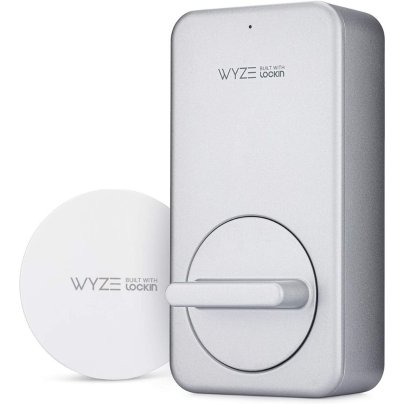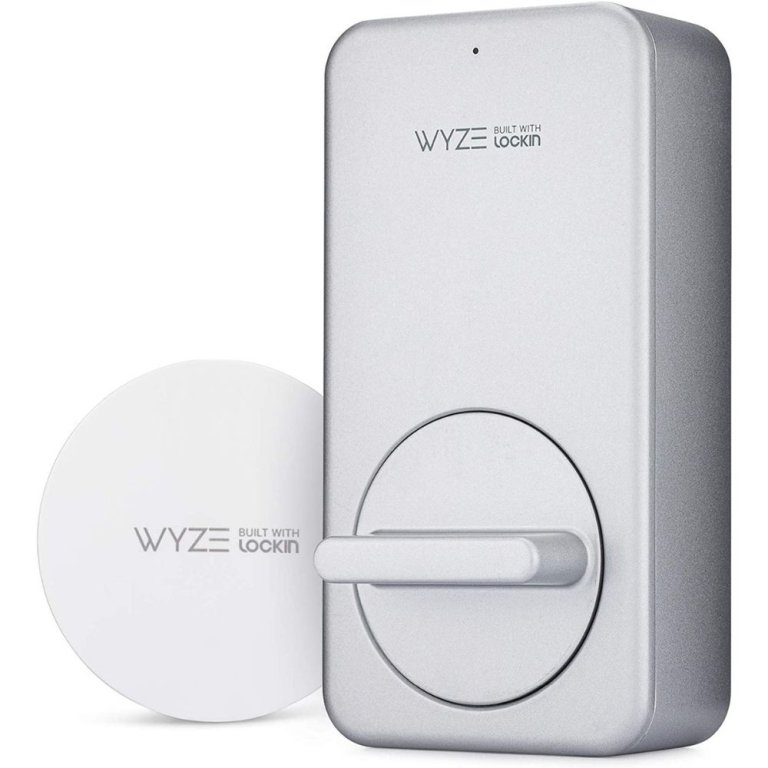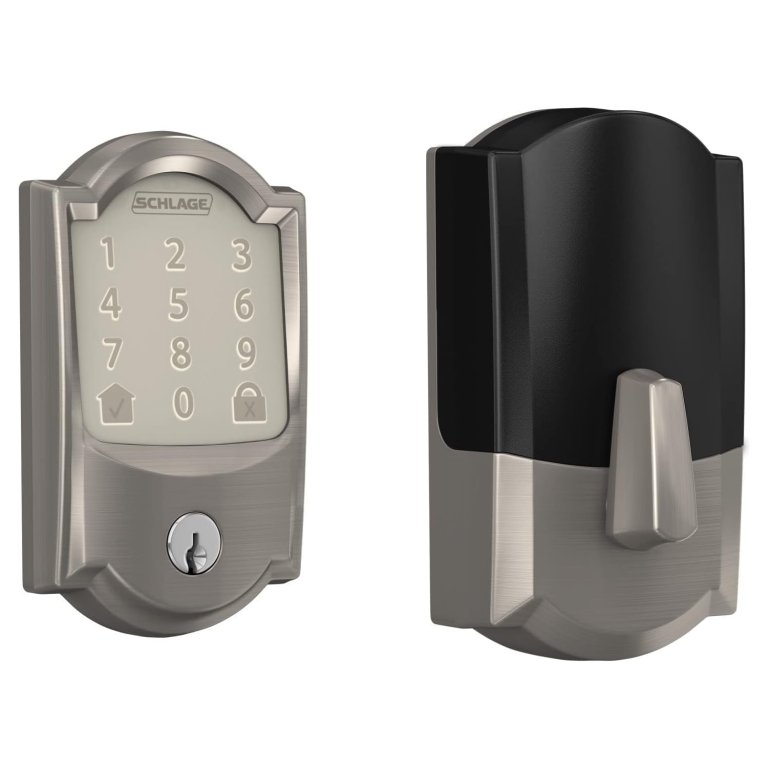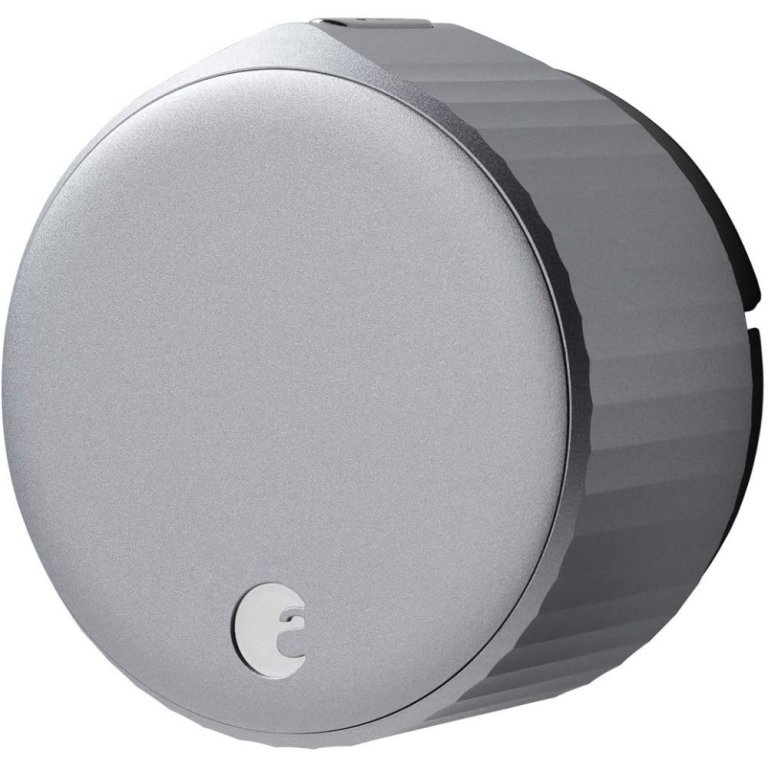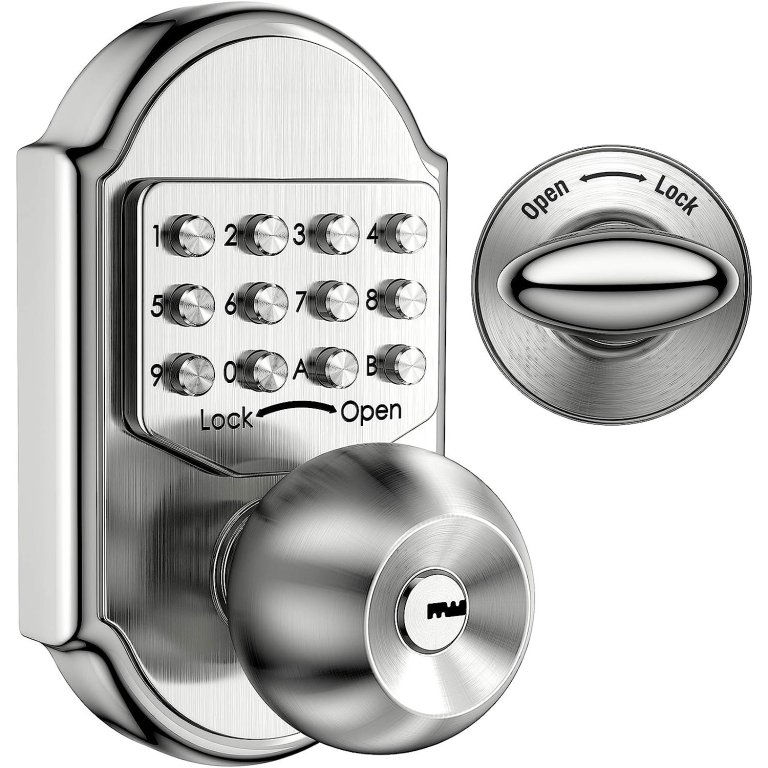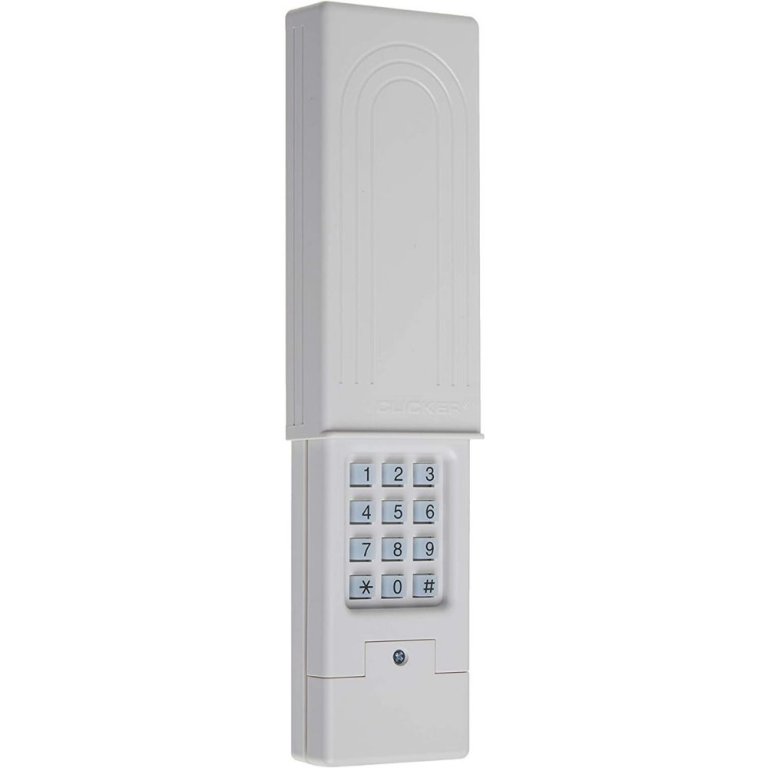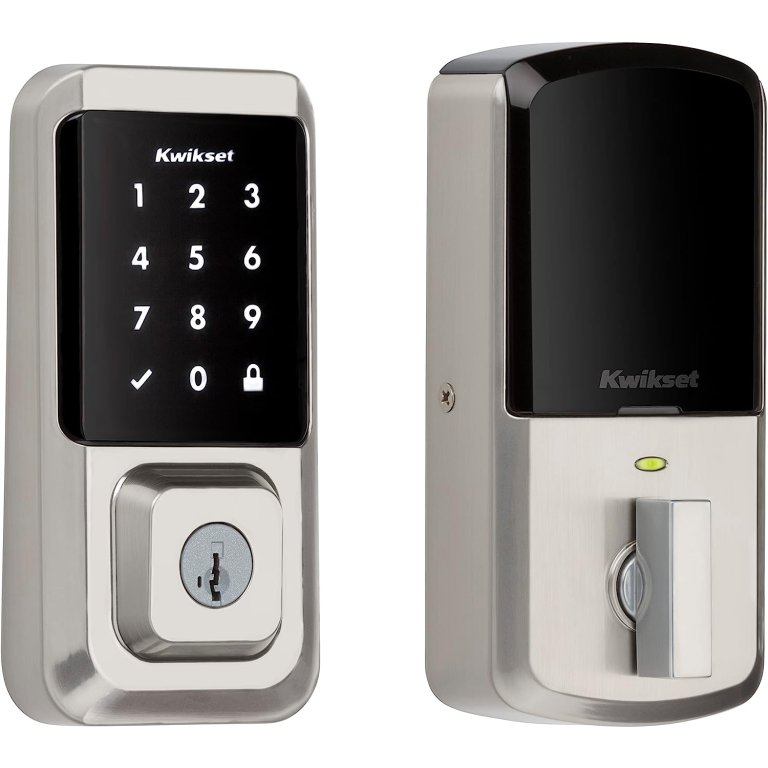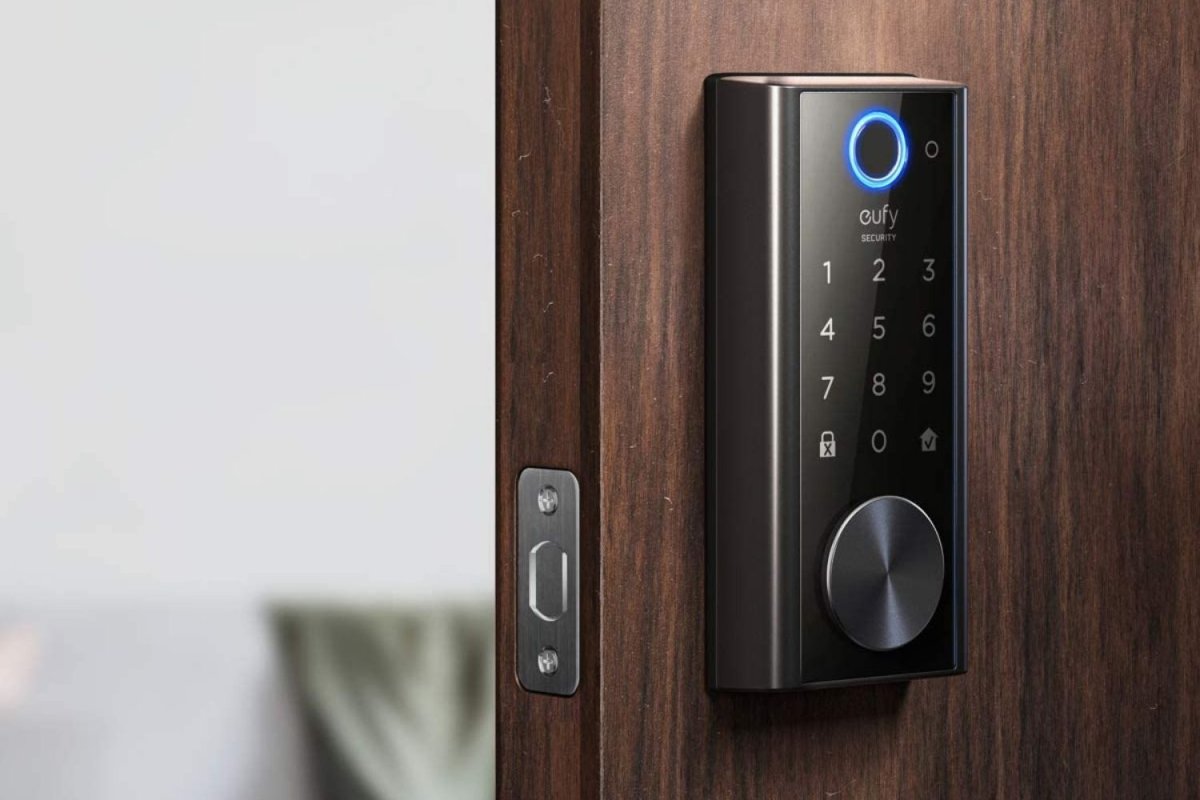
We may earn revenue from the products available on this page and participate in affiliate programs. Learn More ›
Home security is of paramount importance, but fumbling with your keys while juggling packages, especially in nasty weather, is a real pain—if you can even find your keys, that is. The modern solution to this kind of hassle? A keyless door lock.
These devices are designed to grant entry in a variety of ways, including physical or digital keypads, biometric fingerprint scanners, mobile app integration, and even voice control with the appropriate pin or pass phrase. The compatibility of a keyless door lock with Bluetooth, Wi-Fi, and smart-home systems can make life even easier. Use this guide to get a handle on what functions and features will suit you and your household—and why the following models are among the best keyless door locks on the market.
- BEST OVERALL: Yale Assure Lock SL with Z-Wave
- BEST BANG FOR THE BUCK: Wyze Lock Wi-Fi & Bluetooth-Enabled Smart Door Lock
- UPGRADE PICK: Schlage Encode Smart Wi-Fi Deadbolt Lock
- BEST FINGERPRINT: Eufy Security Smart Lock Touch
- BEST DIGITAL DEADBOLT: August Home Wi-Fi 4th Generation Smart Lock
- BEST MECHANICAL: Megaflint Keyless Entry Door Lock
- BEST SMART: Ultraloq U-Bolt Pro Smart Lock + Bridge Wi-Fi Adapter
- BEST FOR GARAGE: Chamberlain Group Clicker Universal Keyless Entry
- BEST FOR RENTAL: Kwikset Halo Keypad Wi-Fi Electronic Smart Lock
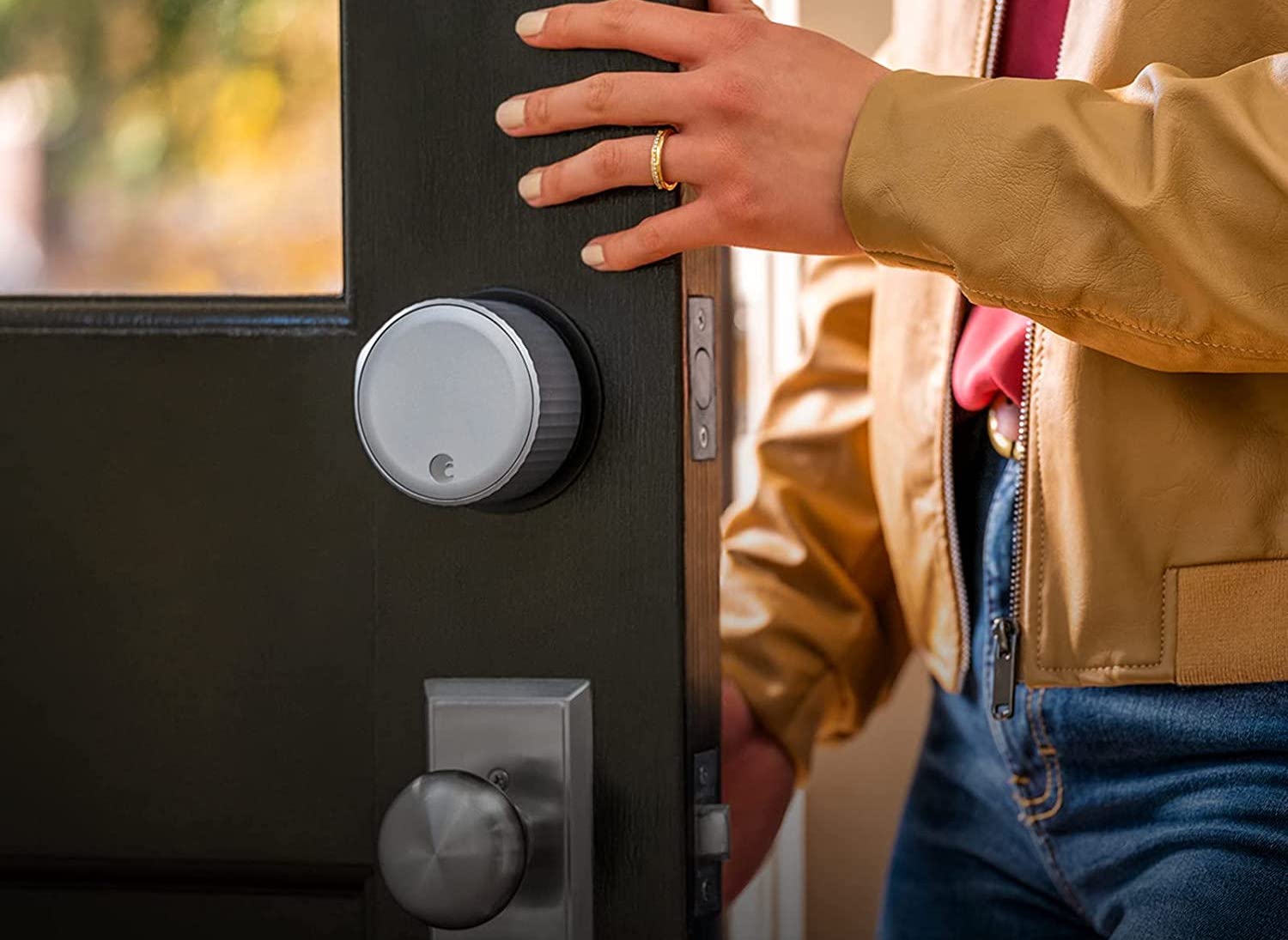
How We Chose the Best Keyless Door Locks
The right keyless door lock for a home can help increase peace of mind while offering some helpful and efficient features.
Many of the featured picks can help keep a home safe with the help of Wi-Fi connectivity; Bluetooth, Alexa, and more smart-home platforms; lit keypads or biometric unlocking systems; backup ways of unlocking the door in emergency situations; and even auto-lock functionality for security.
Some of the above picks also have trackers to monitor for potential false unlocks, anti-peep features, or even bank-grade security programming to keep a home safe. Plus, many of these top picks are easy to install and set up with no need for professional help.
Though affordability is not something that comes to mind with these systems, many of the above products are aesthetically pleasing and even luxurious looking. They are also compatible with most doors. However, note that some of these products require a particular Wi-Fi strength or door type to function properly.
Our Top Picks
The products below are among the best keyless door locks in their respective categories, chosen with an emphasis on overall security, functionality, accessibility, compatibility, and price.
Best Overall
Yale Assure Lock SL with Z-Wave
Pros
- Backlit display keypad makes it easier to read in the dark
- Compatible with Z-Wave systems and Amazon Alexa (requires a hub)
- Includes an auto-lock feature that ensures the door doesn’t get left unlocked
Cons
- Must purchase hub separately unless connecting it to an existing security system hub
Product Specs
- Type: Smart
- Compatibility: Z-Wave, Amazon Alexa
- ANSI grade: 2
Some physical touchpads can fail when exposed to harsh weather, but the smooth-faced touch screen on this keyless door lock sheds moisture, and its backlit display is easy to see even in dim light. The Yale Assure has earned a Grade 2 American National Standards Institute (ANSI) certification for reliability and durability. In addition to touch-screen operation, the lock can connect to Alexa or a compatible Z-Wave smart-home system for wireless access.
Lock the door with a simple tap of the keypad using three fingers, or set up the auto-lock function to lock the door as soon as it closes. The touch-screen keypad has backlit numbers that are clearly visible even in dark conditions, convenient for entering an access code late at night or in harsh weather. If the interior battery dies, holding a 9-volt battery to the terminals will allow you to enter the code and unlock the door.
Get the Yale keyless door lock at Amazon, Walmart, or Yale.
Best Bang For The Buck
Wyze Lock Wi-Fi & Bluetooth-Enabled Smart Door Lock
Pros
- Will automatically lock and unlock based on the proximity of a linked smart device
- Works with Alexa and the Wyze app, devices, and cameras
- Compatible with Wyze Gateway hub and Bluetooth and Zigbee networks
Cons
- Does not have an ANSI security rating listed
Product Specs
- Type: Smart
- Compatibility: Z-Wave, Amazon Alexa, Bluetooth, Wi-Fi
- ANSI grade: Not available
Security needn’t be expensive with this budget-friendly smart door lock. The versatile device can be controlled through the Wyze app when connected to Wi-Fi via the included Wyze Lock Gateway. The lock can also link to compatible Wyze devices, like the Wyze Lock Keypad and Wyze Cam for added home security.
A screwdriver is all that’s needed to retrofit an existing deadbolt and complete this keyless door lock’s installation in minutes. Set it up for auto locking and auto unlocking so that the lock will respond to the proximity of a linked device, like a smartphone or tablet. This lock can also connect to Amazon Alexa for voice-activated control with a secure voice pin.
Get the Wyze keyless door lock at Amazon, Walmart, or Best Buy.
Upgrade Pick
Schlage Encode Smart Wi-Fi Deadbolt Lock
Pros
- Offers the highest level security a lock can offer with its ANSI 1 rating
- Doesn’t require a hub to control via a phone or voice assistant
- Will detect and alert the user to attempted forced entries
Cons
- Some users complain that it burns through batteries too quickly
Product Specs
- Type: Smart
- Compatibility: Wi-Fi, Google Assistant, Alexa, Apple Home
- ANSI grade: 1
This lock comes at a premium price, but it’s worth it for the level of security and wireless features that it offers. The Schlage Encode is an ANSI level 1-rated lock, which is the highest level of security wireless locks offer. It connects directly to Wi-Fi with no need for a hub, can be controlled via a smartphone with the Schlage Home app, and is compatible with such voice assistants as Google Assistant and Alexa.
Along with being able to lock and unlock the app from anywhere via a smartphone, you can also enter and manage up to 100 access codes for guests. The Encode goes beyond controlling the lock. It will also alert the user if it senses an attempted forced entry. Since the Schlage Encode comes in four different finish options, it’s easy to pair it with a home’s existing door hardware.
Get the Schlage deadbolt lock at Amazon, Lowe’s, or The Home Depot.
Best Fingerprint
Eufy Security Smart Lock Touch
Pros
- 0.3-second biometric scanning via fingerprints that’s 98 percent accurate
- Automatically locks the door when it’s closed
- Stores fingerprint data locally, making it harder to hack
Cons
- Only works with a lever-handle door with a deadbolt lock
Product Specs
- Type: Fingerprint/touch screen
- Compatibility: Bluetooth, Wi-Fi
- ANSI grade: 2
The biometric scanner in this Eufy smart lock works well for quick locking and unlocking. It has a sleek black design with a circular fingerprint scanner that takes just 0.3 seconds to scan and recognize a stored fingerprint. The lock is accurate 98 percent of the time, reducing repetitive scanning attempts.
The touch-screen keypad can also be used with a code, a good secondary-access option. The lock has strong bank-grade encryption to protect the personal data of the users, and it can also connect through Bluetooth to the eufy security app for wireless control.
Get the eufy keyless door lock at Amazon, The Home Depot, or Walmart.
Best Digital Deadbolt
August Home Wi-Fi 4th Generation Smart Lock
Pros
- Compatible with an existing deadbolt and key lock, making it easy to install
- Works with digital voice assistants such as Alexa, Siri, and Google Assistant
- Auto-lock/unlock features when linked to a smart device
Cons
- Requires a longer-range 2.4GHz Wi-Fi network connection
Product Specs
- Type: Digital deadbolt/Smart
- Compatibility: Bluetooth, Wi-Fi, Google Assistant, Alexa, Siri
- ANSI grade: 1
This innovative digital deadbolt from August connects to smart-home systems, linked devices, smartphones, and tablets through a 2.4GHz Wi-Fi network. It’s designed to retrofit an existing deadbolt on just one side of the door so that mechanical keys will still work as a backup, plus it’s easy to set up right out of the box.
The digital deadbolt can link with Siri, Alexa, and the Google Home App to activate voice-control features, such as locking/unlocking and checking whether the door is open or closed. You can enable the auto-lock and auto-unlock functions so that the door will unlock when you approach and lock when you leave without a key or a smartphone.
Get the August Home keyless door lock at Amazon or The Home Depot.
Best Mechanical
Megaflint Keyless Entry Door Lock
Pros
- All-mechanical design eliminates the need to change batteries
- Can set passcodes of up to 8 digits long for up to 8,000 possible combinations
- Made from wear-resistant and pry-resistant hardened stainless steel
Cons
- Only includes a doorknob on 1 side of the door
Product Specs
- Type: Mechanical
- Compatibility: N/A
- ANSI grade: N/A
Megaflint’s keyless door lock is a great option for those who don’t want to worry about changing batteries in their keyless lock or securing it from hackers. This lock uses no electricity and won’t connect to any Wi-Fi networks. Instead, it uses a 100 percent mechanical design to offer keyless entry.
It features a 12-button panel that allows you to set passcodes of between four and eight digits. The deadbolt opens with a turn of the knob after the correct code has been entered. There’s also a keyhole to bypass the coded lock. The lock itself is secure thanks to its extra-hard stainless steel construction. The Megaflint is easy to install in doors with existing deadbolt locks.
Get the Megaflint keyless door lock at Amazon or Sears.
Best Smart
Ultraloq U-Bolt Pro Smart Lock + Bridge Wi-Fi Adapter
Pros
- Compatible with Alexa and Google Assistant when connected to a Wi-Fi network
- 6 ways to unlock, including fingerprint, code, smart device, shake to open, auto unlock, and key
- Anti-peep keypad design adds an extra layer of security
Cons
- Requires a long-range 2.4GHz Wi-Fi connection
Product Specs
- Type: Smart
- Compatibility: Wi-Fi, Bluetooth, Alexa, Google Assistant
- ANSI grade: 1
Smart-home systems are designed to link multiple devices like a video doorbell, security camera, and a smart lock so that IFTTT (If This Then That) protocols can be programmed to automate home security. This keyless door lock can also link to smart-home devices like Alexa and Google Assistant to operate the lock using a security code and voice command.
It also features six additional methods for unlocking the door: a fingerprint scanner, an anti-peep keypad, access through a smartphone app, the auto-unlock function, the shake-to-open function on Android phones, and a mechanical backup key. To outsmart the wear that repetitive input of the security code can cause—revealing the numbers of the code—an anti-peep feature lets the user put in numbers before and after the code. This way, any wear pattern is dispersed across a wider sample of numbers, making it near impossible to tell what numbers are in the code.
Get the Ultraloq keyless door lock at Amazon, The Home Depot, or Walmart.
Best for Garage
Chamberlain Group Clicker Universal Keyless Entry
Pros
- Can program in any 4-digit encryption passcode into keypad
- Keypad lights up when pressed for clear visibility in dark conditions
- Compatible with many different brands of garage door opener
Cons
- Keypad is not compatible with smart-home systems, Wi-Fi, or Bluetooth
Product Specs
- Type: Electronic
- Compatibility: Connects to most existing garage door openers
- ANSI grade: N/A
When a home is empty or the residents are asleep, an unprotected garage can become a target for thieves. This keyless garage door lock from Chamberlain connects to an existing garage door opener with an easy-to-follow wireless setup. The simple keypad lock is compatible with almost all brands of garage door openers manufactured after 1993.
A secure four-digit pin must be entered correctly or the garage door opener will not respond. This system is also designed with secure wireless encryption to prevent hacking. The keypad has backlit numbers that are clearly visible in the dark, and a simple sliding cover protects it from the elements.
Get the Chamberlain keyless door lock at Amazon, The Home Depot, or Chamberlain.
Best For Rental
Kwikset Halo Keypad Wi-Fi Electronic Smart Lock
Pros
- Connects to Wi-Fi without the need for a central hub
- Users can lock and unlock as well as monitor use via a smart device
- Can create and manage temporary access codes for renters
Cons
- Powered by AA batteries; may need frequent changes
Product Specs
- Type: Smart
- Compatibility: Wi-Fi, Alexa, Google, Google Assistant
- ANSI grade: N/A
Kwikset’s Halo gives owners who rent out their property control over access to their rentals without having to be on the premises. The Halo connects to Wi-Fi without the need for a hub, allowing owners to lock and unlock it via a smartphone from virtually anywhere. You can create up to 250 codes on the lock, all of which can be managed via the Kwikset app, making it ideal for giving renters temporary access to the property.
The app also provides other information that’s useful to rental property owners. Users can view history for the lock’s activity and choose to receive notifications every time the Halo is locked or unlocked. For added security, there’s also a built-in alarm that sounds when three consecutive incorrect codes are entered. The smart lock integrates with Amazon Alexa and Google Assistant.
Get the Kwikset keyless door lock at Amazon or Best Buy.
Jump to Our Top Picks
What to Consider When Buying a Keyless Door Lock
When shopping for a high-quality keyless lock for the front, back, or garage door, factor in the lock type, its ANSI security rating, and its compatibility with already-existing systems in the home.
Type
Types of keyless door locks are differentiated by their compatibility and function, including touch screen, fingerprint, digital deadbolt, Bluetooth, and smart locks.
- Touch-screen door locks have a smooth digital touch-screen keypad display. Enter the security pin on the touch-screen keypad and the lock will open. These electronic door locks can use over 100 unique security codes for family, friends, workers, or even guests at an Airbnb.
- Fingerprint keyless door locks rely on biometrics (body measurements and calculations that determine and authenticate an individual’s identity) via a fingerprint scanner. Several fingerprints can be recorded by the device, which will open the lock if an approved finger touches on the scanner.
- Digital deadbolts are typically retrofitted to existing door hardware, upgrading home security with basic smart-locking functions that are accessible through an app on a smartphone or similar device. They usually use Bluetooth, though some digital deadbolts can connect to Wi-Fi and smart-home systems.
- Bluetooth-enabled keyless door locks connect with a smartphone or tablet via Bluetooth, which is usually accessed with a custom app made and maintained by the lock manufacturer. This allows you to open or close the lock from anywhere inside the house, the car, or any other locations within range of the Bluetooth signal.
- Smart keyless door locks are similar to Bluetooth-enabled locks in that they typically connect to an app accessible through a smartphone or tablet. However, these locks will use Wi-Fi, Z-Wave, Zigbee, or Bluetooth to become part of the existing smart-home system. This way, they can be added to a series of IFTTT protocols that take advantage of the interconnected system.
- Mechanical keyless door locks use no electronic pieces inside of them. Instead, the lock has buttons and a locking mechanism that are entirely mechanical. This type of lock doesn’t require battery changes and can only be unlocked by punching the correct combination of buttons on the lock itself.
- Electronic keyless door locks are typically used in conjunction with a garage door. They consist of a keypad mounted to the exterior part of the garage door frame that connects wirelessly to the garage door opener. When the user enters the correct code on the keypad, the garage door opens.
Security Level
Security is the main priority with any lock, so look for security ratings when shopping for the best keyless door locks. The Builders Hardware Manufacturers Association (BHMA) is accredited by ANSI to develop and maintain performance standards for locks. These standards can be known as BHMA ratings, ANSI ratings, BHMA gradings, ANSI gradings, or even a combination of the two with ANSI/BHMA ratings or gradings.
These ratings are based on the security of the lock against picking, bumping, and other physical attacks. They also take into consideration the durability and longevity of the locking and unlocking mechanism.
- Grade 1 is the highest rating for ANSI-approved locks, though these products are typically designed for commercial applications. These locks protect against a variety of physical attacks including picking, heavy blows, drilling, and cutting.
- Grade 2 is the mid grade for ANSI ratings. This grade is given to products that can resist picking attempts, bumping, and kick ins, making these locks a good choice for a residential front door.
- Grade 3 is the lowest ANSI-approved rating. These locks may not be durable enough to withstand a strong break-in attempt. Choose a grade 3 lock as a supplementary option to a Grade 2 or Grade 1 lock.
Access Codes
Depending on the type of keyless door lock, you may need to put a code into a physical or digital keypad to gain entry. These codes are generated by the lock or chosen by the resident; they should be easy to remember, but not something unauthorized people would be able to guess. Access codes are typically four digits, but that may be customized by the user if desired.
Keyless door locks often have enough memory for over 100 unique access codes, allowing every trusted individual to come and go. This feature is great for rental units because the code can simply be changed when the lease is up.
Backup Keys
While the purpose of a keyless door lock is to avoid needing and keeping track of keys, a backup key feature can be beneficial. This typically consists of a hidden keyhole in the keyless door lock that can be accessed in case of emergency or if the lock is not working properly.
Locks that connect through Wi-Fi or Bluetooth can be susceptible to connection issues, while electronic devices like a digital keypad, screen, or fingerprint scanner may run out of power. If one of these situations occurs, a backup key will grant access to the home. Also, consider investing in a portable charging device to keep the keyless door lock at full battery.
Device Compatibility
Home security innovations have combined standard door locks with wireless capabilities that allow them to integrate with other devices through Bluetooth, Wi-Fi, Z-Wave, or Zigbee. However, the compatibility of the door lock with the other devices depends on the specific product and how it is designed.
- Bluetooth locks can be basic, communicating only with the smartphone or device they’re registered with, but they may also integrate on an IFTTT network with several other Bluetooth devices.
- Z-Wave and Zigbee are similar smart-home networks that can connect wirelessly to other Z-Wave or Zigbee devices in the home.
- WiFi-enabled door locks connect through a Wi-Fi signal to a hub or network. Smart-home systems like Amazon Alexa and Google Home generally use a Wi-Fi connection to link all the devices in the residence so that they can be controlled through voice commands, IFTTT protocols, or an app.
Additional Functionality
With the inclusion of electronic systems and the compatibility of wireless networks, a keyless door lock can include extra features to make the lock easier to use, like voice activation, geofencing, and auto locking.
- Voice activation is accessible through integration with smart-home systems like Alexa and Google Home. By speaking through the door to the device and providing a custom code, the door lock will open or lock depending on the voice command.
- Geofencing sets up a wireless perimeter around the home that can use the GPS in a cell phone or tablet to determine when someone enters or leaves the perimeter. It can be set to automatically unlock the door when someone gets home and lock the door when someone exits the perimeter.
- Auto locking can be used with geofencing, but this feature can also come with keyless door locks that lack geofencing. This is done via a timer so that the door automatically locks after a specific period of time has passed.
Ease of Use
Keyless door locks offer a variety of ways to operate the lock. Some may be a bit complicated to set up, but once in place, they’re easy to use and maintain.
- Keypad door locks can have over 100 different unique codes to assign to residents, delivery services, and workers such as dog walkers and house cleaners.
- Fingerprint scanners tend to be popular among families with children who might forget a code. To gain entry, the kids need only scan a recorded finger at the door.
- Smart locks can connect to a smart-home system, enabling the locks to be opened with a voice command and secure code.
- Key fobs can also operate a keyless door lock, but, like keys, they are small and easy to misplace.
Aesthetic
Security should be the top priority when deciding on a keyless door lock, but there’s no reason to settle on one that doesn’t look attractive or suit the architectural style of the house. Some locks are integrated with the door handle, presenting one solid unit with a keypad to unlock the door quickly, which might fit a traditional home’s decor. Others complement a technology-rich environment with prominent digital screens, interesting fingerprint scanners, and modern appeal.
FAQs
For further info about buying and using keyless door locks, check out these answers to some common questions.
Q. How do keyless entry door locks work?
Keyless door locks work in the same way as standard door locks: with a bolt that slides across to prevent entry. However, instead of using a key to open the lock, a keyless door lock may require a fingerprint scan, secure pin number, app access through Bluetooth or Wi-Fi, or voice-activated commands when the lock is paired with a smart-home system.
Q. What are ANSI/BHMA security ratings?
ANSI/BHMA security ratings are designations handed down by the Builders Hardware Manufacturers Association to indicate the effectiveness of the smart lock depending on the product’s ability to pass increasingly rigorous test requirements.
Q. Do smart locks work without Wi-Fi?
Yes, but with less ease and accessibility because the unlock codes can no longer be entered through an app. The lock may have a fingerprint scanner, a physical touch pad, or a backup keyhole to lock or unlock the door whether the Wi-Fi is on or not.
Q. How do smart locks get power?
Keyless door locks typically run on batteries, which are either replaced when they die or charged with an included charger.
Q. Do smart locks have cameras?
Some keyless door locks do have built-in cameras. Unfortunately, the angle of the camera is often blocked due to the height at which door locks are typically installed, so the current technology is not very popular or reliable. For better video protection, consider pairing a keyless door lock with a video doorbell or security camera.
Q. Can keyless door locks be hacked?
Keyless door locks, like any digital technology, can be hacked if the hacker has adequate skill, time, access, and information. For this reason, digital security information should be kept private. Despite this vulnerability, hacking door locks is uncommon, and these locks tend to be more secure than most traditional locks that can be picked or bumped.

